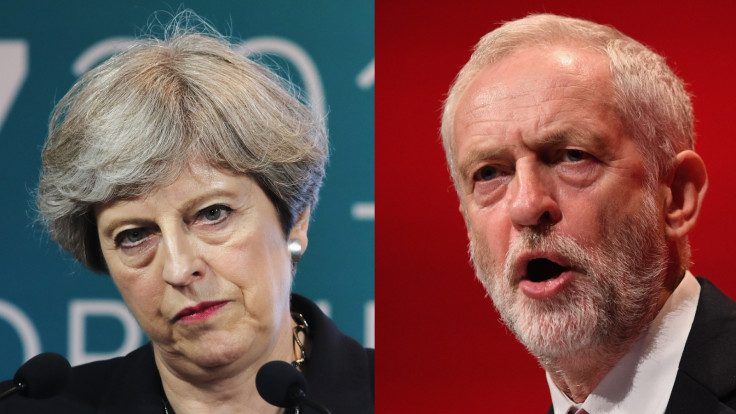You don't have to be a Corbyn fan to see the media obsesses over his dirty laundry
We shouldn't focus on things in the past when the government is inflicting misery in the present.
I am something of a sceptic when it comes to the television leaders' debates. They have always seemed to me to be an Americanism: a reduction of competing ideas into the straightjacket of the presidential soundbite. They are the ideal platform for the quip or wisecrack that plays well on the evening news, but they seem to leave the voter no wiser as to what each party will do once in office.
My aversion to the format is partly a hangover from 2015, when Ed Miliband squared off against David Cameron - or to be more precise, when both men squared off against Jeremy Paxman. In theory, two completely different visions of Britain were to be put on the table and pitted against one another. In practice, the BBC and other assorted news outlets simply ran with endless loops of Miliband declaring that "hell yes" he was tough enough to 'face down' Vladimir Putin, whatever that meant.
This perhaps gets to the crux of why television debates of the sort we saw again last night throw out more heat than light: the interviewer simply homes in unremittingly on the things we already knew about the politician in question. Or in Jeremy Paxman's case, they showboat and interrupt proceedings far too frequently, giving the impression that they think it is about them rather than about the candidates we are supposed to be choosing to be the Prime Minister.
To the surprise of many, the Labour leader Jeremy Corbyn 'won' last night's grilling by a studio audience and head to head with Paxman. One of the few joys of the past tumultuous year has been watching establishment pundits struggle to stay upright as the ground has shifted remorselessly beneath their feet.
In his dealings with Paxman, Corbyn came out on top very often simply by flipping the script on his interlocutor. At a time when workers have been subjected to the longest wage freeze since the 1850s, when food bank use has skyrocketed, and when one in four children are expected to live in poverty by 2020, endlessly rehashing jingoistic questions as to the Labour leader's unwillingness to unleash nuclear armageddon wore thin quite quickly.
The unspoken accusation that the leader of the opposition 'loathes Britain' does not hit home so effectively when there is a suspicion that the party of his opposite number loathes quite a lot of its inhabitants.
There was a similar disconnect when Paxman lined up against Theresa May. "But you don't really believe [in Brexit]", he boomed superciliously, ignoring the fact – as has been the wont of much of the commentariat – that for most people the Brexit question (in its most straightforward form) has already been put to bed. Like a third-rate actor, Paxman seemed to spend most of the night acting out a moment - or in this case an era - that has already passed.

During the 90 minutes of the debates – ample time you would think to cover a wide range of topics - there was very little light shed on the two leaders' respective plans for the economy, education or healthcare. It was, as could easily have been predicted beforehand, politics as showmanship, a shiny personality contest geared more to the title tattle-obsessed lobby than the voting public.
Social media throughout the hour-and-a-half largely obsessed over who looked the most 'flustered' and which leader espoused the catchiest one-liners. Other than who might be the best 'performer' on camera – hardly the sternest test of one's fitness to govern – it is doubtful that anyone learnt anything new at all from the tame sparring match.
The country – for the first time in my lifetime – would conceivably vote for much of what is contained in Labour's radical manifesto
But while Corbyn probably edged it for anyone watching the grillings as they happened - May has justifiably been labelled the 'Maybot' on Twitter - for the larger number of people who will only have turned on the 10 o'clock news once the interviews had finished, it was Theresa May who looked to have emerged victorious. After all, what matters in these things is not how lucid, persuasive and ebullient you are. What ultimately decides the type of coverage you receive is how easily any controversies can be whittled down to fit into a catchy 10 second clip with which to lead the news programmes. Following last night's contest, and disastrously for Labour, the BBC led with Corbyn fulminating windily on the IRA.
And of course it was grossly unfair of them to do so. I have been as critical as anyone of the Labour leader's past foreign policy dalliances, but there is something meretricious and false in moralising haughtily about things that are firmly in the past when the government is inflicting a good deal of its own misery in the present.
Yet this is the nature of politics. Your soiled laundry will invariably be unpacked and flaunted publicly whether you like it or not. Jeremy Corbyn's downfall will be that he comes with masses of the stuff – he has as much baggage as the tightly-packed hold of a 747. Which is a great shame, because you sense that the country – for the first time in my lifetime – would conceivably vote for much of what is contained in Labour's radical manifesto.
What they won't do, however, is vote en masse for a caricature that – as his supporters ought to have foreseen long ago - it is much too easy for the media to fashion out of the man.
James Bloodworth is former editor of Left Foot Forward, one of the UK's top political blogs, and the author of The Myth of Meritocracy. Follow : @J_Bloodworth
© Copyright IBTimes 2025. All rights reserved.






















